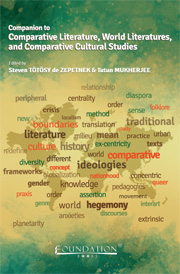Book contents
- Frontmatter
- Contents
- Introduction to the Companion to Comparative Literature, World Literatures, and Comparative Cultural Studies
- PART 1 Theories of Comparative Literature, World Literatures, and Comparative Cultural Studies
- PART 2 Comparative Literature in World Languages
- PART 3 Examples of New Work in Comparative Literature, World Literatures, and Comparative Cultural Studies
- African Literatures and Cultures and the Universal of Motherhood
- World literatures and the Case of Joyce, Rao, and Borges
- Abject Spaces and the Hinterland in Bolaño's Work
- The Motif of Fleeing in Gao's Work
- Arab Fiction and Migration in the Work of Haqqi and Salih
- Sexual Identity and Translation in Prime-Stevenson's Work
- The Notion of Life in the Work of Agamben
- Aesthetics, Opera, and Alterity in Herzog's Work
- An Intermedial Reading of Paley's Sita Sings the Blues
- Painting and Representation in Teaching Balzac
- PART 4 Multilingual Bibliography of Books in Comparative Literature, World Literatures, and Comparative Cultural Studies
- Index
Aesthetics, Opera, and Alterity in Herzog's Work
from PART 3 - Examples of New Work in Comparative Literature, World Literatures, and Comparative Cultural Studies
Published online by Cambridge University Press: 05 April 2014
- Frontmatter
- Contents
- Introduction to the Companion to Comparative Literature, World Literatures, and Comparative Cultural Studies
- PART 1 Theories of Comparative Literature, World Literatures, and Comparative Cultural Studies
- PART 2 Comparative Literature in World Languages
- PART 3 Examples of New Work in Comparative Literature, World Literatures, and Comparative Cultural Studies
- African Literatures and Cultures and the Universal of Motherhood
- World literatures and the Case of Joyce, Rao, and Borges
- Abject Spaces and the Hinterland in Bolaño's Work
- The Motif of Fleeing in Gao's Work
- Arab Fiction and Migration in the Work of Haqqi and Salih
- Sexual Identity and Translation in Prime-Stevenson's Work
- The Notion of Life in the Work of Agamben
- Aesthetics, Opera, and Alterity in Herzog's Work
- An Intermedial Reading of Paley's Sita Sings the Blues
- Painting and Representation in Teaching Balzac
- PART 4 Multilingual Bibliography of Books in Comparative Literature, World Literatures, and Comparative Cultural Studies
- Index
Summary
Abstract: In his article “Aesthetics, Opera, and Alterity in Herzog's Work” Jacob-Ivan Eidt analyses Werner Herzog's 1982 film Fitzcarraldo. Eidt's analysis is executed in the context of opera, cinema, and aesthetics. Eidt argues that Herzog uses opera as a romantic motif with which he creates a self-critical process whereby elements of the Romantic vision are called into question thus providing a nuanced reading of the main character and the Indigenous world he encounters. This process, Eidt argues, produces a complex narrative of colonial alterity where colonial self-inscription upon an Other is ultimately doomed to failure.
A prominent aspect of comparative humanities is not only its emphasis on multiple literary traditions, but also the ability to bring those traditions together to produce nuanced contextual readings of various text types (see, e.g., Finke; Tötösy de Zepetnek). In this study, I analyze Werner Herzog's 1982 film Fitzcarraldo and its image construction of colonial South America including the role of Otherness. I postulate that the film's image construction of the Other is based on German Romanticism and paradigms of aestheticism of nineteenth-century music. In keeping with the methods of comparative cultural studies, hierarchical relationships between traditions are avoided. Each tradition is read as contributing to an overall depiction, in this case of colonial alterity. This intertextuality draws attention to other cultures in a way that traditional film reading could not and it is through this contrast that the Other can be approached and thus included into what otherwise would remain a Euro-centric perspective.
- Type
- Chapter
- Information
- Companion to Comparative Literature, World Literatures, and Comparative Cultural Studies , pp. 460 - 471Publisher: Foundation BooksPrint publication year: 2014



